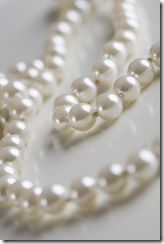What I like most about good books are the nuggets of philosophy found scattered throughout their pages – nuggets that cause me to think or re-consider my own attitudes.
Though expressed by fictional characters, such nuggets also offer insight into the personal philosophies of the writer. 
The simply named *The Bird in the Tree by Elizabeth Goudge is full of such nuggets, most often thought or said by Lucilla, the Eliot family matriarch.
Following are some of the pearls of wisdom I gathered while reading this first book of Goudge’s Eliot Family Chronicles. The trilogy also includes The Herb of Grace and The Heart of the Family.
On God
We all try to make God in our image. It is one of the worst of our temptations. (pg. 278)
On aging
One would know the first cold breath of old age when one found oneself in a world where there was no one left to whom one was a child. (pg. 117)
On a danger of beauty
Such a [beautiful] woman could not help but be blinded, now and again, by the smoke from the fires that she kindled. (pg. 281)
On receiving praise
The acceptance of homage gives no permanent satisfaction; it is better to give it. What is given to you, you are always afraid will one day cease to be given, but what you give you can give forever. (pg. 66)
On the value of retrospection
You cannot judge anything without its context, and you cannot judge the value of what happens to you until many years afterwards. Then you see how one thing led to another and how it was all, even the little trivial things as well as the big ones, somehow necessary. (pg. 253)
*First published by Gerald Duckworth and Co. Ltd., 1940
Talk to me. Do you have any literary pearls of wisdom to share?

In the introduction to “Witness,” by Whittaker Chambers, Rebecca West says Chambers “writes as writers by vocation try to write, and he makes the further discoveries about reality, pushing another half-inch below the surface, which writers hope to make when they write.” Chambers says about Communism, “It is the vision of man’s mind displacing God as the creative intelligence of the world. It is the vision of man’s liberated mind, by the sole force of its rational intelligence, redirecting man’s destiny….
This is not the same kind of wisdom that Elizabeth Goudge writes about, but this book has been full of “Aha!” moments for me.
Yvonne, I really enjoy the observation that writers hope to push below the surface of reality. I think Rebecca West has at least in part answered the question, “Why do we write?” There is such reward in providing others with “Aha!” moments.
Thanks for the thoughts.
Pingback: The Eliots of Damerosehay | Aging in Wonder
Ah, the wonders of the internet! I read this book 30 years ago in a guest house and have been looking for it ever since. Today, I decided to try the internet, again, and here you are! I remember two things from “bird.” One was something said, I’m sure, by Lucilla (whose name I’d forgotten) to the effect that loving acts can create love as much as love can create loving acts. I have held this closely all these years. The other was a brief poem that I have always believed came from that book. Maybe someone who has a copy could check for me.
My memory is
“This is death:
To leap from the utmost heights of ecstatic being
Straight into the night.”
Thanks for filling in some of the gaps!
Kate – Thanks so much for commenting!
That quote certainly sounds like it could be from one of Goudge’s books. I wish I owned the book and could help you verify it. The book I read was a library copy.
I’m thankful to my sister Yvonne for helping me discover Elizabeth Goudge; recently, she determined to find and purchase every Elizabeth Goudge book she could. The second two books of the trilogy were easier to find. I think she finally bought The Bird in a Tree from somewhere in the UK.
I’m impressed you found my little blog through an Internet search! What words did you use? Do you remember? Just curious.
Pingback: The Eliots of Damerosehay | Cheryl's Desk